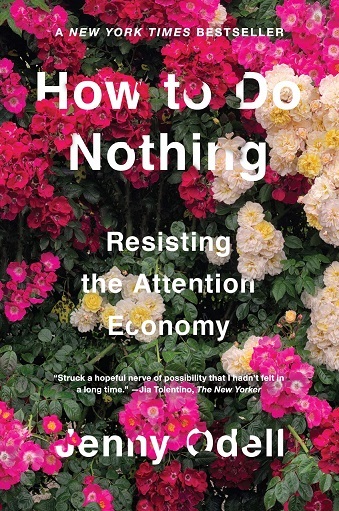
"When the technologies we use every day collapse our experiences into 24/7 availability, platforms for personal branding, and products to be monetized, nothing can be quite so radical as… doing nothing. Here, Jenny Odell sends up a flare from the heart of Silicon Valley, delivering an action plan to resist capitalist narratives of productivity and techno-determinism, and to become more meaningfully connected in the process."Goodreads
The alternative of Odell is to do nothing. Above everything, it means being careful and learning how your mind is focused on the world around you. It also means fighting the efforts of social media to catch your attention. This will make you appreciate the world around you more meaningfully.
In this book, there are some interesting ideas that I love the most.
We think spending leisure is wasting of time:
That is because time is money, and you can demonstrate something with your time – whether you get a job done or improving yourself, which I also consider as a job. Anything that hampers this is too costly, in time-is-money concepts. In the late 1800s, American workers required workdays of 8 hours. They want 8 hours of work, 8 hours of rest, and eight hours of what they want to do, in the words of a popular labor union album. Basically, they had time to do nothing outside of class. Their contributions paid off in the 20th century, and the eight-hour working day became normal. The economic danger was seen by people as something once that only corporations have to think about. The society grew acquainted with the notion that they would take care of you if you had a job and worked hard. But the traditional career these days, is no longer so secure.
We believe we're brands of social media:
It is prudent that we spend the rest of our time behaving like companies, so we are all capitalist. That has been facilitated through social media. Because we can always worry about jobs, though we don't work. It's like anywhere on the capital exchange where everything is a prospect of investment. This affects social media operations, as people track their personal brands continuously to ensure that their reputation continues to develop. People who want to maintain a clear picture are dull and repetitive. It's not just good, there's an identity over time that doesn't change. The author thinks it is unhealthy since it means that we neglect our human potential. We're all evolving as individuals. But Twitter's social media platforms don't reflect the changes in us. They actually allow us to present ourselves as favorably as possible, leading to a lack of identity and uniqueness over time.
What we value in life needs to be analyzed:
There's still an economy on. Every moment of the day, people must catch and count it. They will miss out if they don't. Despite this focus on efficiency and usefulness, others also assume that the sense derives from serendipity or spontaneous meetings – something happening from time to time. The author explains the notion of on-site resistance. This means that dominant mechanisms will avoid being appropriated. According to the author, the values of lives must not be calculated inefficiency.
Original Source of the original story >> Jenny Odell Book - How to Do Nothing Book Review -






